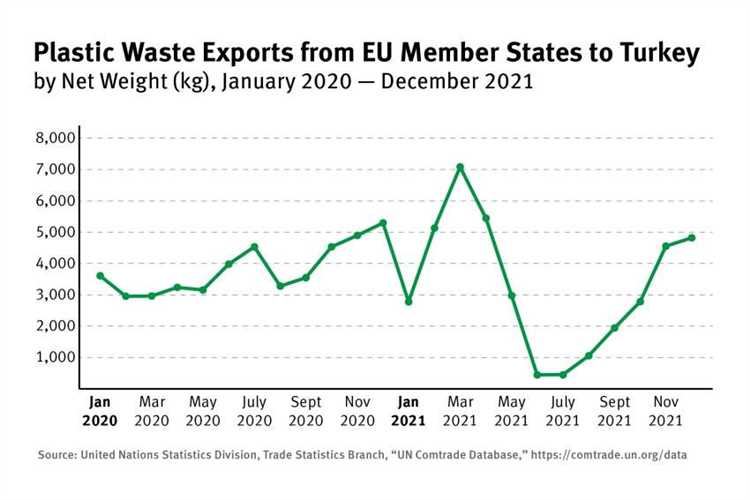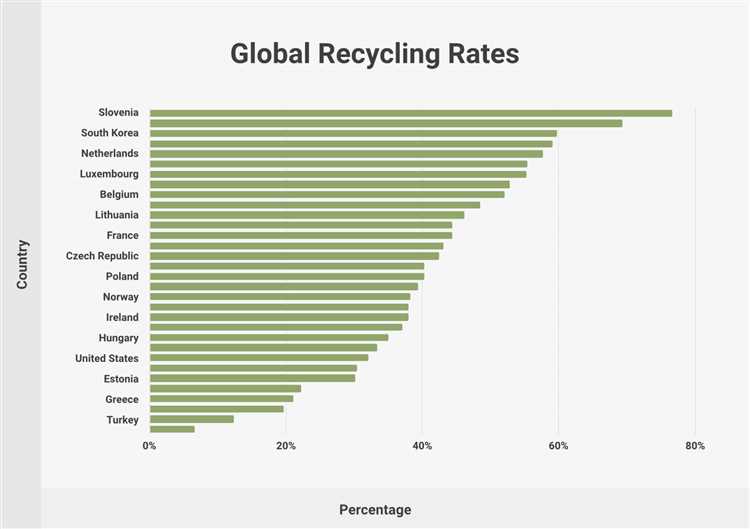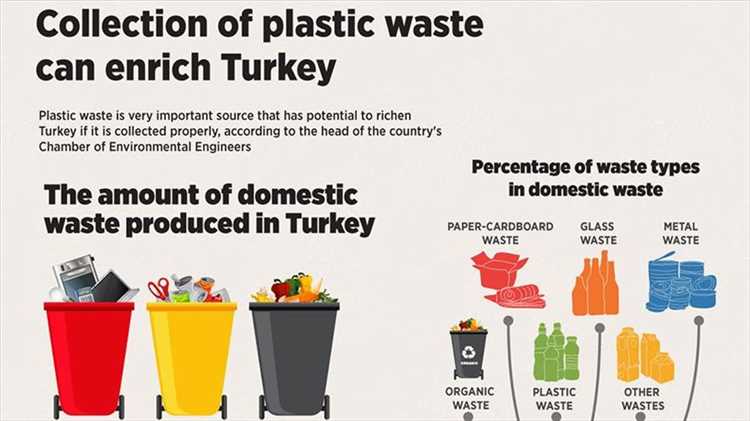
Recycling has become an increasingly important issue worldwide, as countries strive to reduce waste and protect the environment. Turkey, with its growing population and industrial development, is also committed to improving its recycling rate. In recent years, the country has made significant progress in this area, implementing policies and initiatives to encourage recycling and increase awareness among its citizens.
One of the key facts about recycling in Turkey is that the country has set a target to recycle 35% of its waste by 2023. This ambitious goal reflects the government’s commitment to sustainable development and environmental protection. To achieve this target, Turkey has been investing in recycling infrastructure and implementing educational programs to promote recycling practices.
Another important aspect of recycling in Turkey is the wide range of materials that are being recycled. From paper and plastics to glass and metal, the country has established recycling facilities and collection systems for various types of waste. This comprehensive approach ensures that a significant amount of recyclable materials are diverted from landfills and given a second life.
The efforts to increase recycling rates in Turkey have yielded positive results. According to recent figures, the country’s recycling rate has been steadily increasing, reaching 15% in 2020. While there is still a long way to go to achieve the 35% target, this progress is promising and demonstrates that the country is moving in the right direction.
In conclusion, the recycling rate in Turkey is on the rise, thanks to the government’s commitment and the efforts of its citizens. With continued investment in recycling infrastructure and education, it is expected that Turkey will reach its target of recycling 35% of its waste by 2023. This will not only contribute to environmental protection but also promote a more sustainable and greener future for the country.
- Facts and Figures about Recycling Rate in Turkey
- Recycling Infrastructure
- Recycling Rates
- Challenges and Future Goals
- Current Recycling Rates in Turkey
- Benefits of Recycling in Turkey
- Challenges to Recycling in Turkey
- Lack of Infrastructure
- Awareness and Education
- Inefficient Waste Management
- Government Initiatives to Increase Recycling Rates
- Successful Recycling Programs in Turkey
- Future Outlook for Recycling in Turkey
- 1. Increased Awareness and Education
- 2. Infrastructure Development
- Questions and answers:
- What is the current recycling rate in Turkey?
- Why is the recycling rate in Turkey so low?
- How does the recycling rate in Turkey compare to other countries?
- What are the benefits of increasing the recycling rate in Turkey?
- What measures can be taken to improve the recycling rate in Turkey?
Facts and Figures about Recycling Rate in Turkey
Turkey has made significant progress in improving its recycling rate in recent years. Here are some key facts and figures about recycling in Turkey:
Recycling Infrastructure
- Turkey has been investing in its recycling infrastructure to ensure the proper collection and processing of recyclable materials. As a result, the country has seen a steady increase in its recycling capacity.
- Currently, there are over 2,000 recycling facilities in Turkey, including sorting and processing plants. These facilities are capable of handling various types of recyclable materials.
- Major cities in Turkey, such as Istanbul, Ankara, and Izmir, have implemented comprehensive recycling programs to encourage residents to recycle and provide convenient access to recycling bins.
Recycling Rates
- The recycling rate in Turkey has been steadily increasing over the years. In 2020, the overall recycling rate in the country reached 16%. This is a significant improvement compared to previous years.
- Paper and cardboard have the highest recycling rates in Turkey, with a rate of 67%. Other materials with high recycling rates include glass (42%), plastic (27%), and aluminum (25%).
Challenges and Future Goals
- Although Turkey has made progress in recycling, there are still challenges that need to be addressed. One of the main challenges is the lack of awareness and education about recycling among the general population.
- The Turkish government has set a goal to increase the recycling rate to 35% by 2023. To achieve this goal, there will be a focus on improving public awareness, implementing stricter recycling regulations, and investing in new recycling technologies.
- Another challenge is the proper separation of recyclable materials. Many people still mix different types of materials together, which hinders the recycling process. Education campaigns and improved waste management systems are being implemented to address this issue.
In conclusion, Turkey has made significant progress in improving its recycling rate, but there is still room for improvement. With continued investment in recycling infrastructure and increased public awareness, Turkey is on track to achieve its recycling goals.
Current Recycling Rates in Turkey
Turkey has made significant progress in improving its recycling rates in recent years. As of the latest data available, the recycling rate in Turkey stands at 19%. This shows a considerable increase from just a few years ago when the rate was only around 5%.
One of the main factors contributing to the improvement in recycling rates is the increased awareness and efforts put in place by the Turkish government. Various campaigns and educational programs have been implemented to encourage citizens to recycle and properly dispose of waste.
In addition to the government’s initiatives, there has been an increase in the number of recycling facilities and infrastructure across the country. This has made it easier for people to recycle and has also created new job opportunities in the recycling sector.
| Year | Recycling Rate |
|---|---|
| 2015 | 5% |
| 2016 | 8% |
| 2017 | 12% |
| 2018 | 15% |
| 2019 | 19% |
Despite the progress made, there is still room for improvement. The recycling rate in Turkey is lower compared to some other European countries, where rates can reach up to 50% or more. Efforts are being made to further increase recycling rates and promote a more sustainable approach to waste management.
In conclusion, Turkey has seen a significant improvement in its recycling rates in recent years. The government’s initiatives, along with the increase in recycling facilities, have contributed to this progress. However, there is still work to be done to reach higher recycling rates and promote a more sustainable future.
Benefits of Recycling in Turkey

Recycling plays a crucial role in Turkey’s efforts to achieve environmental sustainability and reduce its impact on the planet. Here are some key benefits of recycling in Turkey:
| 1. Conservation of Resources | Recycling helps conserve valuable natural resources, such as forests, water, and minerals. By reusing materials like paper, plastic, and glass, Turkey can reduce the need for raw materials extraction, helping to protect the environment. |
| 2. Energy Savings | Recycling materials requires less energy compared to producing them from raw materials. By recycling, Turkey can save energy resources and reduce greenhouse gas emissions associated with energy production. |
| 3. Reduction of Landfill Waste | Proper recycling practices help divert waste from landfills. By recycling, Turkey can decrease the amount of waste going to landfills, thereby extending their lifespan and reducing environmental pollution. |
| 4. Economic Opportunities | Recycling can create new economic opportunities by generating jobs in waste management, collection, and recycling industries. Turkey can benefit from a sustainable circular economy that promotes resource efficiency and creates a greener future. |
| 5. Reduced Greenhouse Gas Emissions | Recycling helps reduce greenhouse gas emissions associated with waste decomposition in landfills. By recycling, Turkey can contribute to mitigating climate change and protecting the environment for future generations. |
In conclusion, recycling in Turkey offers significant benefits, including resource conservation, energy savings, waste reduction, economic opportunities, and reduced greenhouse gas emissions. It is crucial for individuals, businesses, and the government to actively participate in recycling initiatives for a sustainable and greener future.
Challenges to Recycling in Turkey
Despite efforts to increase recycling rates in Turkey, there are several challenges that hinder the progress in this area. These challenges include:
Lack of Infrastructure
Turkey lacks sufficient recycling infrastructure, such as collection systems and recycling facilities, to support efficient and widespread recycling efforts. There is a need for investment in infrastructure development to enable the collection, sorting, and processing of recyclable materials.
Awareness and Education

Another challenge is the lack of awareness and education about recycling among the general population. Many people are unaware of the importance of recycling and the positive impact it can have on the environment. There is a need for comprehensive educational campaigns to raise awareness and promote recycling practices.
Inefficient Waste Management
The inefficient waste management system in Turkey contributes to the low recycling rates. The lack of proper waste separation and disposal practices makes it difficult to recover recyclable materials. Improving waste management practices and implementing effective recycling programs are crucial to increasing recycling rates.
Inadequate Government Support
The lack of adequate government support is another challenge to recycling in Turkey. There is a need for stronger regulations and incentives to encourage recycling and create a favorable environment for recycling businesses. The government should provide financial support and implement policies that promote recycling initiatives.
In conclusion, Turkey faces several challenges in increasing its recycling rates, including the lack of infrastructure, awareness and education, inefficient waste management, and inadequate government support. Overcoming these challenges will require collective efforts from the government, private sector, and the general public to promote and prioritize recycling in the country.
Government Initiatives to Increase Recycling Rates
The Turkish government has implemented several initiatives to encourage and increase recycling rates in the country. These initiatives aim to raise awareness about the importance of recycling and provide incentives for individuals and businesses to participate in recycling programs.
One of the key initiatives is the establishment of recycling centers across the country. These centers serve as collection points for recyclable materials such as paper, plastic, glass, and metal. Citizens can bring their recyclable waste to these centers, ensuring that it is properly sorted and processed for recycling.
In addition to recycling centers, the government has also introduced recycling bins in public spaces such as parks, streets, and shopping malls. These bins are clearly labeled and color-coded to make it easier for individuals to dispose of their waste correctly. The presence of recycling bins in public areas helps to encourage the habit of recycling among the general population.
The government has also implemented recycling education programs in schools and universities. These programs aim to educate students about the environmental impact of waste and the benefits of recycling. By integrating recycling education into the curriculum, the government hopes to instill sustainable habits in the younger generation.
Furthermore, the government has introduced financial incentives for businesses to adopt recycling practices. Companies that implement efficient recycling programs can receive tax benefits and financial support from the government. These incentives encourage businesses to reduce their waste generation and prioritize recycling as part of their operations.
Overall, the Turkish government is committed to increasing recycling rates in the country through a combination of awareness campaigns, infrastructure development, and financial incentives. With the implementation of these initiatives, it is hoped that Turkey will see a significant increase in recycling rates in the coming years.
Successful Recycling Programs in Turkey
Turkey has implemented a number of successful recycling programs aimed at minimizing waste and promoting sustainable practices. These programs have significantly contributed to increasing the recycling rate in the country. Some of the notable recycling programs in Turkey include:
| Program | Description | Impact |
|---|---|---|
| Zero Waste Program | The Zero Waste Program focuses on reducing waste generation and promoting the recycling of waste materials. It encourages individuals and businesses to adopt waste sorting practices and utilize recycling facilities. This program has helped divert a significant amount of waste from landfills and contributed to a more sustainable waste management system. | Significantly reduced the amount of waste sent to landfills and increased recycling rates. |
| Plastic Bottle Recycling Campaign | This campaign aims to increase the recycling rate of plastic bottles in Turkey. It includes awareness-raising activities and the establishment of collection points for plastic bottle recycling. The campaign has successfully encouraged individuals to separate and recycle their plastic bottles, leading to a substantial increase in plastic bottle recycling rates. | Increased recycling rates of plastic bottles and reduced environmental impact of plastic waste. |
| Paper Recycling Initiative | The Paper Recycling Initiative focuses on promoting the recycling of used paper and cardboard. It involves collaborations with educational institutions, businesses, and communities to raise awareness about the benefits of paper recycling and provide convenient collection points. This initiative has resulted in a significant increase in paper recycling rates throughout Turkey. | Increased the recycling rates of paper and cardboard, reduced deforestation, and conserved natural resources. |
| Electronic Waste Recycling Program | This program aims to address the issue of electronic waste by encouraging the proper disposal and recycling of electronic devices. It includes awareness campaigns, collection events, and partnerships with recycling facilities. The program has successfully improved the collection and recycling of electronic waste, reducing the environmental impact associated with improper disposal. | Increased electronic waste recycling rates and reduced environmental hazards caused by improper disposal of electronic devices. |
These successful recycling programs in Turkey demonstrate the country’s commitment to sustainable waste management and environmental preservation. Through consistent efforts and collaborations between various stakeholders, Turkey has been able to achieve significant progress in recycling and contribute to a more sustainable future.
Future Outlook for Recycling in Turkey
Turkey has made significant progress in recycling in recent years, but there is still room for improvement. The government has recognized the importance of recycling and has implemented various initiatives to promote and increase recycling rates in the country.
1. Increased Awareness and Education
One of the key factors for improving recycling rates in Turkey is increasing awareness and education among the general population. The government is working to educate citizens about the benefits of recycling and the proper methods of waste separation. By conducting awareness campaigns and providing educational materials, the aim is to change people’s attitudes and behaviors towards recycling.
2. Infrastructure Development
In order to support the increasing demand for recycling, Turkey is investing in the development of recycling infrastructure. This includes the construction and improvement of recycling facilities, as well as the implementation of modern and efficient waste management systems. By enhancing the infrastructure, the country can better collect, sort, and process recyclable materials.
| Recycling Facility | Capacity | Location |
|---|---|---|
| Plastic Recycling Plant | 50,000 tons/year | Istanbul |
| Paper Recycling Facility | 30,000 tons/year | Ankara |
| Glass Recycling Center | 20,000 tons/year | Izmir |
The construction of new recycling facilities and centers across the country will not only create jobs but also ensure the efficient handling of recyclable materials.
In conclusion, the future outlook for recycling in Turkey is promising. With increased awareness and education, as well as the development of recycling infrastructure, the country is on track to further improve its recycling rates and contribute to a more sustainable future.
Questions and answers:
What is the current recycling rate in Turkey?
The current recycling rate in Turkey is around 13%. This means that only 13% of waste generated in the country is being recycled.
Why is the recycling rate in Turkey so low?
There are several reasons for the low recycling rate in Turkey. One reason is the lack of infrastructure and facilities for recycling. Another reason is the limited awareness and knowledge about the importance of recycling among the general population. Additionally, there is a lack of government policies and incentives to promote recycling.
How does the recycling rate in Turkey compare to other countries?
The recycling rate in Turkey is lower than many other countries. For example, the recycling rate in Germany is around 65%, while in Sweden it is around 99%. Turkey has a lot of room for improvement when it comes to recycling.
What are the benefits of increasing the recycling rate in Turkey?
There are several benefits of increasing the recycling rate in Turkey. Firstly, it can help reduce the amount of waste that goes to landfill, which can have environmental benefits. Secondly, recycling can help conserve natural resources by reducing the need for new raw materials. Lastly, increasing the recycling rate can also create new job opportunities and boost the economy.
What measures can be taken to improve the recycling rate in Turkey?
There are several measures that can be taken to improve the recycling rate in Turkey. Firstly, the government can invest in the development of recycling infrastructure and facilities. This can include establishing more recycling plants and providing incentives for businesses to recycle. Secondly, there needs to be a greater focus on education and awareness campaigns to promote the importance of recycling among the general population. Lastly, the government can introduce policies and regulations that make recycling mandatory and impose penalties for not recycling.